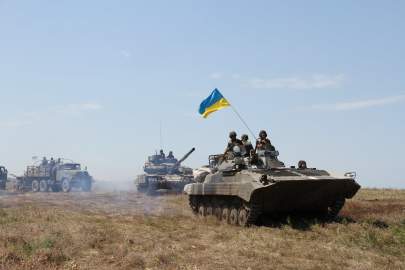Wagner and Russian Army Cooperate in a fresh push to take Bakhmut.

Russia stepped up its campaign to capture Bakhmut in eastern Ukraine, pushing Ukrainian forces further from the city center as explosions rocked Russian-occupied Melitopol ahead of an expected Ukrainian counteroffensive targeting the south.
Meanwhile, China’s foreign minister said that Beijing won’t send Russia munitions for the conflict, its strongest response yet to statements by U.S. officials that China was considering such assistance to Moscow. At the same time, however, Moscow announced Friday that the Chinese defense minister will visit Russia next week for talks on bolstering defense cooperation between the two countries.
Bakhmut has seen months of intense fighting as a bloody Russian onslaught pushes back Ukrainian units defending the city. Ukrainian forces still hold the city’s western districts, but they have been subjected to particularly intense artillery fire since Wednesday, the U.K.’s Defense Ministry said in a statement.
According to the U.K. assessment, recent gains by Russia have come in part due to better coordination between forces overseen by the Defense Ministry and those of the paramilitary Wagner Group, which has been fighting alongside the regular army largely using convicts recruited from Russian prisons.
There have been sharp tensions between Wagner and Russia’s command in recent months. Wagner owner Yevgeny Prigozhin publicly criticized Russia’s military leadership, including Defense Minister Sergei Shoigu, in February, accusing officials of withholding ammunition from his units. Mr. Prigozhin later said that Wagner had received ammunition.
Wagner’s strength in Bakhmut has been severely depleted after months of combat involving commanders sending convicts on near-suicidal assaults with no air or artillery cover. The group’s forces continue to spearhead the advance through Bakhmut, the U.K. said, but are now receiving more active support from Russian airborne forces that have reinforced the northern and southern flanks of Russia’s military campaign.
Ukraine has been under major pressure to give up Bakhmut, where it has also suffered high losses of manpower and equipment. Nonetheless, the U.K. says it has been able to conduct orderly withdrawals from positions it has been forced to give up, despite major issues resupplying its forces in the city.
Away from the battlefield, Ukraine has been preparing its forces for an expected counteroffensive in the coming weeks.
In his evening address on Thursday, Ukrainian President Volodymyr Zelensky appeared to reference the planned counteroffensive in an update about a Thursday meeting with senior defense officials.
“Our actions will be powerful. We’re preparing our guys,” he said. “And we’re very much waiting for the supply of weapons promised by our partners.”
Kyiv has stepped up strikes on the Russian-occupied city of Melitopol this month as it lays the groundwork for the offensive that is expected to target the south. Melitopol sits along a critical supply line to Crimea and is a potential prime target for the operation to retake Russian-held territory.
A major blast occurred on Friday morning in the area of a train depot where Russian forces had been storing and repairing military equipment, the exiled mayor of Melitopol, Ivan Fedorov, said in an interview on Ukrainian television.
“The morning began very badly for the enemy,” he said. “A massive explosion rang out in the city that was heard even in surrounding villages.”
The train depot allegedly holding Russian military equipment has been severely damaged by a series of recent strikes, Mr. Fedorov said, but it continues to operate.
Vladimir Rogov, a Russian-installed official in the surrounding Zaporizhzhia region, which Russia claims as its territory but only partly controls, confirmed a blast in Melitopol on Friday morning but said a gas cylinder had exploded in a garage.
Meanwhile, China on Friday offered its highest-profile assurance that it wouldn’t sell weapons to either side in the war, pushing back against U.S. allegations that Beijing was considering supplying artillery and drones to Russia.
“Regarding the export of military items, China adopts a prudent and responsible attitude,” Chinese Foreign Minister Qin Gang said at a joint news conference in Beijing with visiting German Foreign Minister Annalena Baerbock, according to the Associated Press. “China will not provide weapons to relevant parties of the conflict, and manage and control the exports of dual-use items in accordance with laws and regulations.”
Russia’s Defense Ministry announced Friday that Chinese Defense Minister Gen. Li Shangfu will visit Russia next week for meetings with Mr. Shoigu to discuss defense and security cooperation. The meeting follows last month’s high-profile visit to Moscow of Chinese leader Xi Jinping.
China has offered Russia critical economic support during the war, while the two countries have also stepped up joint military exercises, as Moscow seeks to offset Western isolation by drawing its partners closer.
Russia’s Defense Ministry also announced on Friday that its Pacific Fleet was put on high alert for a surprise readiness check.
The surprise check also involves Russian airborne forces, as well as military and logistics units, Mr. Shoigu said. He said the drill would involve the Pacific Fleet carrying out missile launches to destroy the naval strike groups and ground targets of a mock enemy. Long-range aviation would also be involved and there would be checks of the readiness of strategic submarines to use weapons, he said.
The exercise seeks to test the readiness of Russia’s military to repel an enemy landing on the Pacific Ocean island of Sakhalin and the disputed southern Kuril Islands. Both Russia and Japan claim the islands, known in Japan as the Northern Territories.
Meanwhile, Brazilian President Luiz Inácio Lula da Silva will meet Chinese leader Xi Jinping in Beijing on Friday, during which the two leaders are expected to discuss a proposal for ending the war in Ukraine.
Read the full article here:











